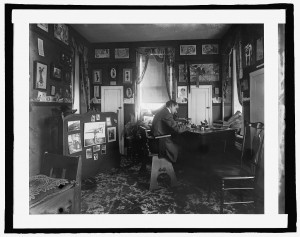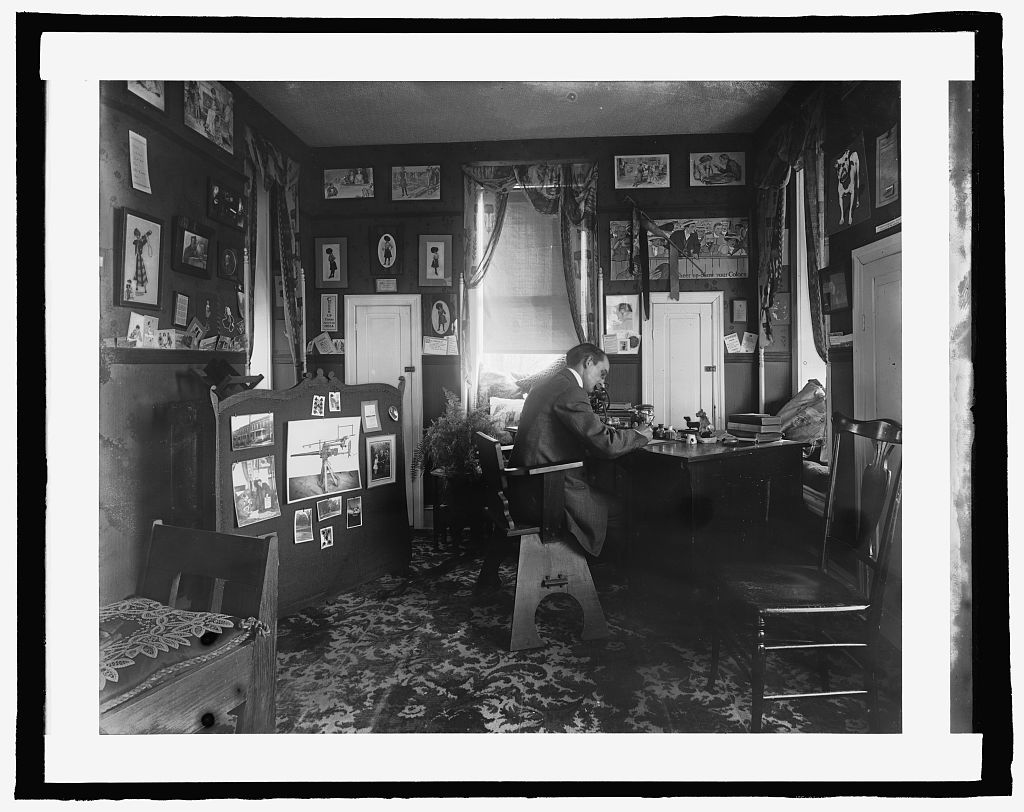 It’s a matter of personal regret that I don’t keep books at my desk. There isn’t room; not if I want to write. Even the little netbook that comes with me to the National Library of Scotland leaves me nowhere to prop books, not really, and one glance around is enough to tell me that no one in sight has solved the problem either. In pre-computer days, it was different: there was space for my desk shelf, and Shakespeare, Brewer’s, my Authorized Version, my BCP and Hymns A&M, Q’s Oxford English Verse, Palgrave, “Anglican Spirituality”, the Concise Oxford and Roget’s (this for mindless browsing rather than reference, as every Roget’s owner knows). That left room for Thomas Browne, the Eikon Basilike, George Herbert and Percy’s Reliques. In front of the shelf, paper, pen, ink bottles and a grounds-encrusted coffee cup. Beyond, the view over St. Clements.
It’s a matter of personal regret that I don’t keep books at my desk. There isn’t room; not if I want to write. Even the little netbook that comes with me to the National Library of Scotland leaves me nowhere to prop books, not really, and one glance around is enough to tell me that no one in sight has solved the problem either. In pre-computer days, it was different: there was space for my desk shelf, and Shakespeare, Brewer’s, my Authorized Version, my BCP and Hymns A&M, Q’s Oxford English Verse, Palgrave, “Anglican Spirituality”, the Concise Oxford and Roget’s (this for mindless browsing rather than reference, as every Roget’s owner knows). That left room for Thomas Browne, the Eikon Basilike, George Herbert and Percy’s Reliques. In front of the shelf, paper, pen, ink bottles and a grounds-encrusted coffee cup. Beyond, the view over St. Clements.
Needless to say, I didn’t own a typewriter. Typewriters were, if anything, bigger cuckoos than computers – here’s Kingsley Amis with his, and here’s Simon Gray’s desk, and Andrew O’Hagan’s; Martin Amis learned from his father’s mistake and writes longhand. The desk/book problem isn’t new. And neither is the issue of what you keep close, and what you keep elsewhere.
In a single room, of course, and in most flats, “elsewhere” means nothing more than out of reach. And yet one feels the difference like east and west. If you know it, then there’s a fascination in how other people have approached the same issue.
In 1972, Philip Larkin was fast approaching the end of his life as a working poet – after 1975, he’d write only in sporadic bursts – but, unhindered by typewriter or screen, could still speak of something as his “working chair”:
Nevertheless, I have always been a compulsive reader, to match one compulsion with another, and this has meant that books have crept in somehow. Only the other day I found myself eyeing a patch of wall in my flat and thinking I could get more shelves in there. I keep novels and detective stories in my bedroom, so that visitors shan’t be tempted to borrow them; the sitting room houses the the higher forms of literature (and my jazz books, a far from exhaustive collecion), while the hall I reserve for thoroughly worthy items, calculated to speed the parting guest. None of them can be called remarkable. At best they are items bought on publication which now qualify as ‘modern first editions’. At worst they are picked from a bad bunch on a station bookstall. I remember that John Malcolm Brinnin says somewhere that he never saw Dylan Thomas read anything but a paperback shocker. Still, they <i>are</i> read, not like Michael Fane’s nine-volume Pater ‘in thick sea-green cloth’ that I doubt ever got opened: read in bed, in the bath, at meals.Within reach of my working chair I have reference books on the right, and twelve poets on the left: Hardy, Wordsworth, Christina Rossetti, Hopkins, Sassoon, Edward Thomas, Barnes, Praed, Betjeman, Whitman, Frost and Owen. True, I reach to the right more often than to the left, but the twelve are there as exemplars.
Twenty years earlier, his friend Kingsley Amis, then, as he, just starting out, wrote to him about his own “vital books” – on a shelf on his bookcase, the desk being occupied by the typewriter, of course.
It consists (if you care) of volumes of poetry by W.H.Auden, John Betjeman, Lawrence Durrell, piss (because out of alphabetical sequnce) John Donne, Andrew Marvell, Alfred Baron Tennyson, William Wordsworth, W.B. Yeats and piss Robert Graves; works of fiction by John Dickson Carr, Cyril Connolly, Graham Greene, Julian Hall, Christopher Isherwood, James Joyce, Henri de Motherlant, Flann O’Brien, Anthony Powell; and works of general interest by Cyril Connolly, William Empson (add piss William Empson to the list of poetry), Graham Greene, Arthur Hutchings (a companion to Mozart’s pianoforte concertos), piss Robert Graves, Q.D. Leavis, W. Somerset Maugham and Stephen Potter (NOT FARCKIN GAMESMANSHIT ETC but The muse in chains). The north ship will be added if I ever get hold of another copy, Jill and A girl in winter when I get them back from loan. Piss Alexander Pope should be added to the poetry. And piss Eddie Condon to the general-interest. There are only three volumes I feel really bad about not having on that shelf: Old lights for new chancels (John Betjeman – Ed), unreturned by some forgotten criminal; Living (Henry Green – Ed), and Poems, by George Herbert.
No mention of Strunk’s, or the Oxford Guide to Style, but then again, none of O’Reilly’s CSS Pocket Reference either..
